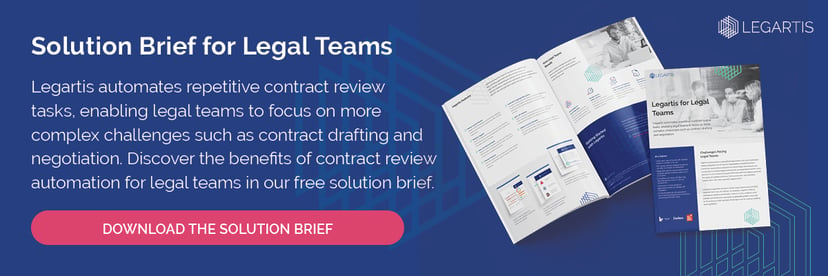Women in LegalTech at Legartis: Marie Schindler
In our blog series "Women in LegalTech", the female members of the Legartis team have their say. In this post, Marie talks about what her work in legal engineering entails, where she sees the future viability of the legal industry going, and why working for a LegalTech company can open up exciting career prospects for young women.
At Legartis, you’re a legal engineer – a job title you don't come across very often. What is legal engineering about?
Together with my team, I work on using Legartis' artificial intelligence to legally evaluate contracts. It’s right at the nexus of software development and machine learning.
Our core work consists of digitally annotating and classifying contracts in order to highlight the legal content of each sentence: is it a warranty claim? Is a contractual penalty being defined? This is time-consuming and can often lead to intense legal discussions. It’s with good reason, however, because we are the ones who create the templates with which the artificial intelligence (AI) is trained. Ultimately, the quality of the results that the AI delivers depends on these templates.
I also regularly evaluate metrics to check how well the artificial intelligence understands the contracts it’s given. After that we correct errors, adjust our classifications, and try to improve the AI's recognition rate. And of course, an important part of the work is to expand the functional scope of this application and, together with my team, prepare new legal topics to train the artificial intelligence in.
What is it that appeals to you about this technology- and analytics-driven legal field?
I find it exciting to help shape the development of LegalTech. Artificial intelligence will not shy away from the legal sector; if anything, it will fundamentally change the way lawyers work in the next few years. It appealed to me to have an influence here.
Before I came to Legartis, I actually had no experience with software development. I can't programme either, but I don't need to. What I’m interested in is how digitalisation is changing our working world, and for this I quickly acquired a brief overview. If I do want to understand some of the more technical details, I can have them explained to me by our software developers and machine learning specialists.
What has your career journey looked like up until this point?
I studied law in Austria and worked for several years in the civil law field at a law firm. If you had asked me when I was studying what I would be doing in the future, I would have never thought that I would one day work for a tech start-up.
However, after a few years of working at the law firm, I realised that it was not the ideal environment for me. As a lawyer, you also have to look after clients whose goals you don't fully agree with. At Legartis, I know that I can stand behind the product I am working on – and I can even develop the product further every day.
What opportunities do you see for future lawyers who want to work with new technologies? Will new professional fields emerge as a result?
The LegalTech field is still a niche. In the next few years, many new jobs will be created in this field that aren’t even foreseeable yet.
Let's take automation as an example: in the legal sector, automation can be applied not only to contracts, but is conceivable in many areas such as in deadline management or in research support – and whenever a new digital solution is developed, employees with legal expertise will be needed to train the software, help shape usability, and monitor the quality of the results.
What do you think – how great is the apprehension of artificial intelligence in legal departments and law firms still?
Artificial intelligence will change the way lawyers in every field work. Companies are already realising that there are great advantages here, and more and more are becoming interested in LegalTech solutions.
The situation is different in law firms: many are still lagging behind in digitalisation and often still work exclusively with paper-based processes. There is hardly any talk of artificial intelligence.
As a lawyer, there is no reason to be afraid of artificial intelligence. It won’t replace lawyers, but rather just simplify their work. It supports them, helps to avoid mistakes and structure work processes, and makes legal knowledge accessible beyond the legal department. That is why, in my view, everyone in the legal sector should work with legal technology if they don’t want to be left behind by its development.
What does a legal department in the future look like for you?
The work will be paperless, digital, but not fully automated. We will continue to need human legal experts for sophisticated legal assessments. And more lawyers will work in technology companies.
What tips can you give to students considering a career in legal tech?
Try it out. Be curious, be open-minded, and don't let technical terms intimidate you. When software developers throw their IT terms around, keep asking them until you understand what they’re talking about. How artificial intelligence and the likes work… you can learn all of that.
At Legartis, I never had the feeling that I had to prove myself as a woman in the tech sector or was expected not to understand IT. All of my colleagues were very supportive at the beginning. LegalTech is an incredibly exciting field in which you can make a big difference.
Discover the full potential of Legartis. Request a demo now.
Recommended Articles
Contract Analysis: What is Achievable with AI Today
Contract analysis is a crucial process in the business world, aiding in risk minimization, ensuring compliance, and maximizing value from business relationships. With ongoing..
Contract AI: Application Areas of AI in Contracts
Contracts are a ubiquitous element in business life. They document past successes, define current obligations, and provide a roadmap for future opportunities. The management..




